Vegetables in German Illustrated Lecture and Sample Sentences
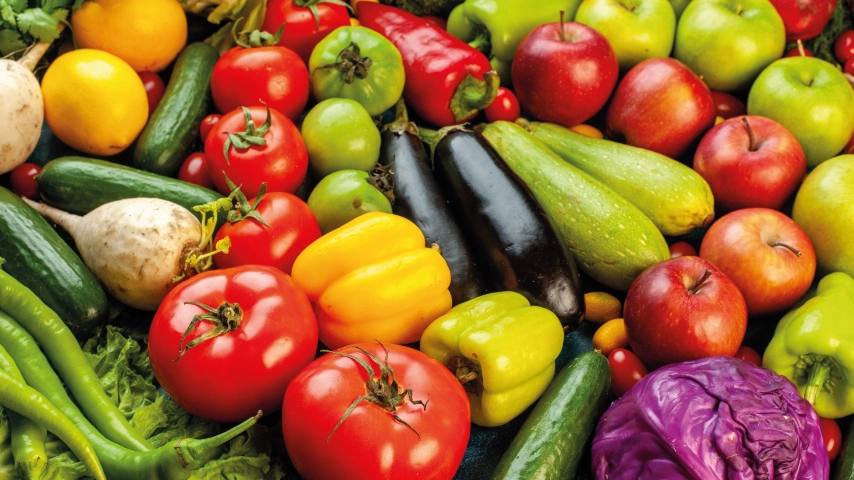
Hello, in this German lesson, we will talk about vegetables in German (die Gemüse). We will learn the singulars and plurals of vegetables in German. First of all, we will learn the German of the most common vegetables. While learning German Vegetables, we will learn together with its articles. In addition, we have prepared for you beautiful visuals of vegetables in German.
The German of these beautiful blessings, colorful vegetables and nuts that our Lord has bestowed on us. with both the singular and the plural we will learn. In our previous lesson German Fruit We examined the subject. We learned fruits with beautiful visuals and made German sentences about fruits. Now we will learn the German of vegetables in the same way.
After learning German vegetables, we will make simple German sentences about these vegetables that we have learned as we scroll towards the bottom of the page.
The topic of vegetables in German is usually taught in the 9th or 10th grade. This course will be for those who learn German by themselves, 9th grade students and 10th grade students. betgram
You may be interested in: Would you like to learn the easiest and fastest ways to make money that no one has ever thought of? Original methods to make money! Moreover, there is no need for capital! For details CLICK HERE
German vegetables now with both their articles and their singular and plurals Let's learn German vegetables one by one.
GERMAN VEGETABLES IMAGEED SUBJECT
Table of Contents
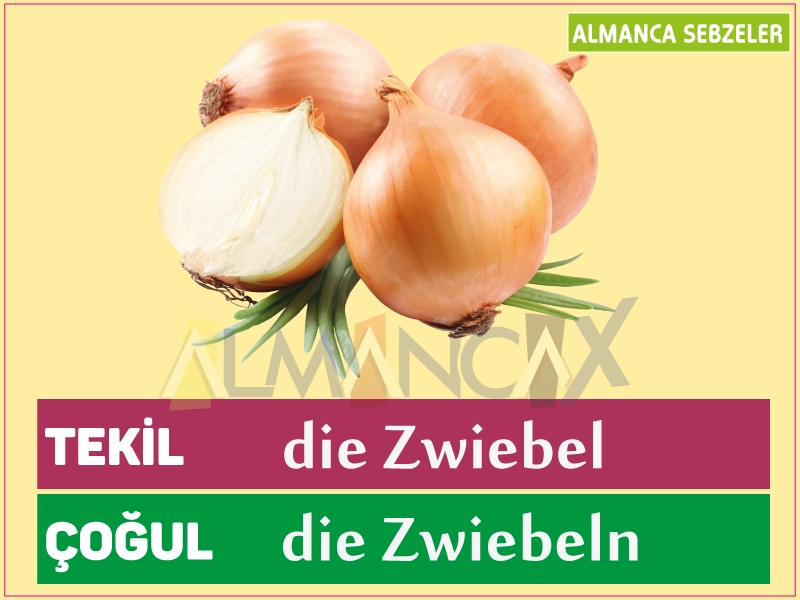
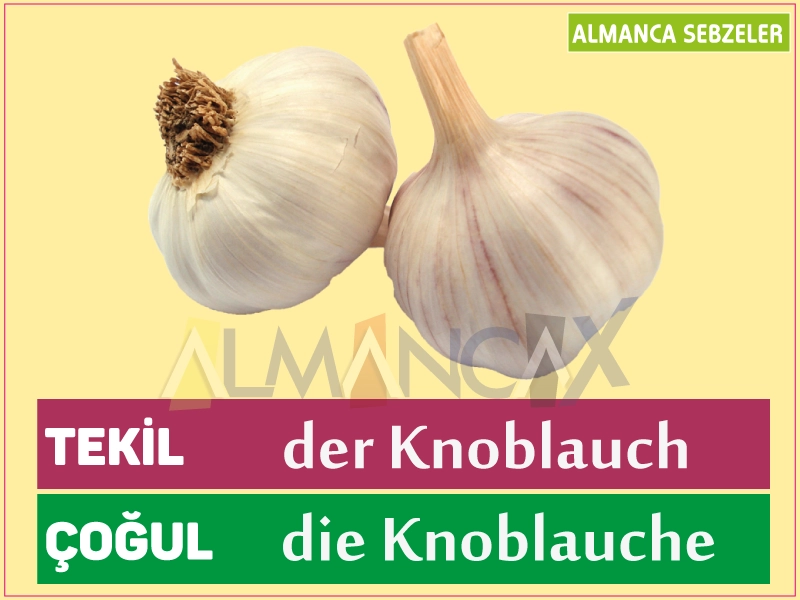
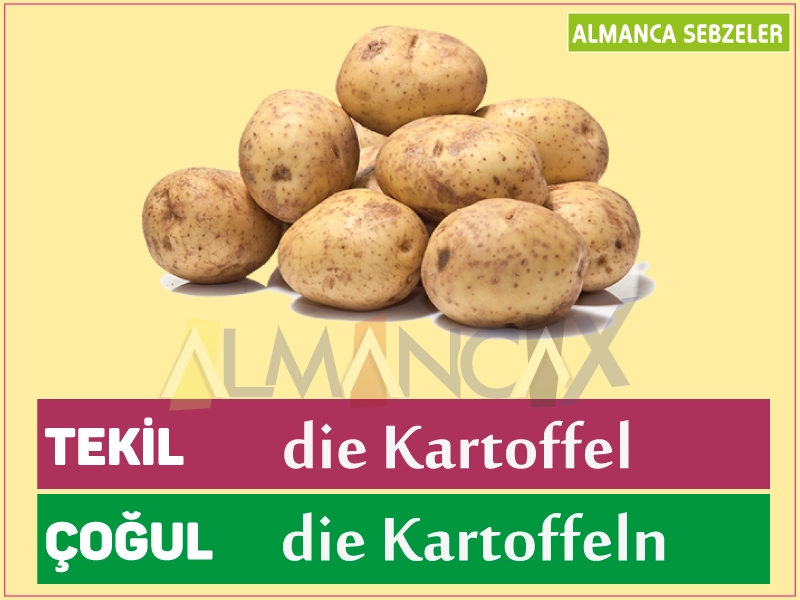
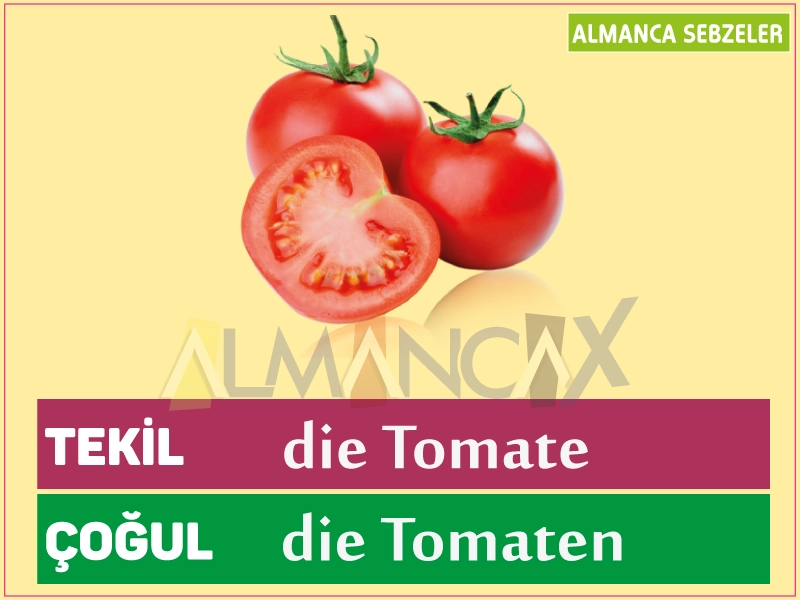
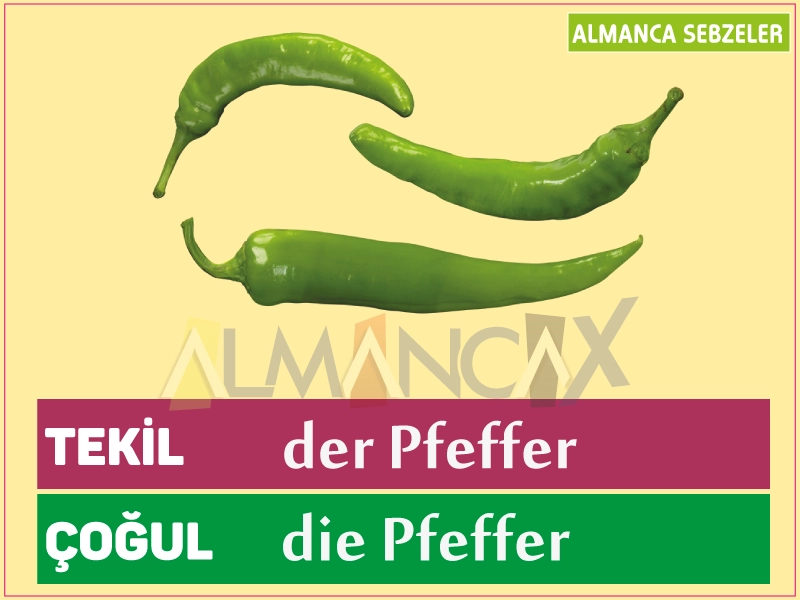
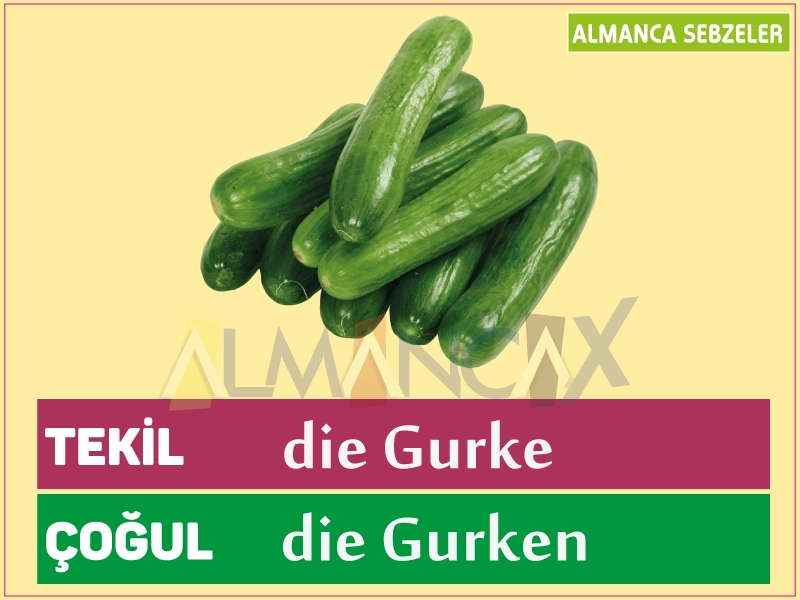
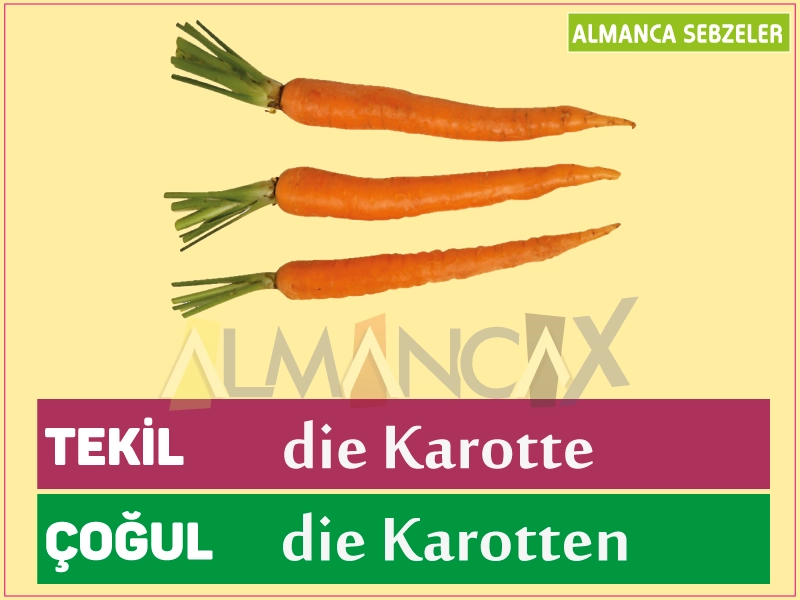
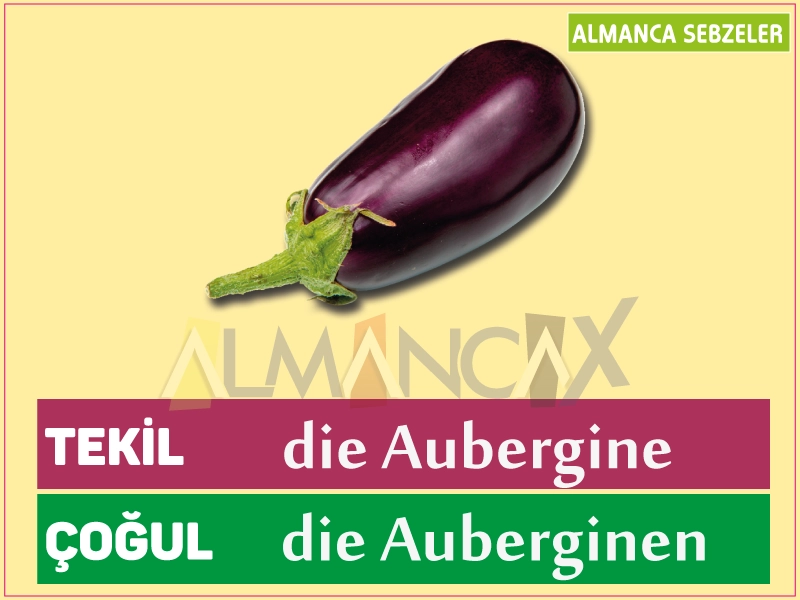
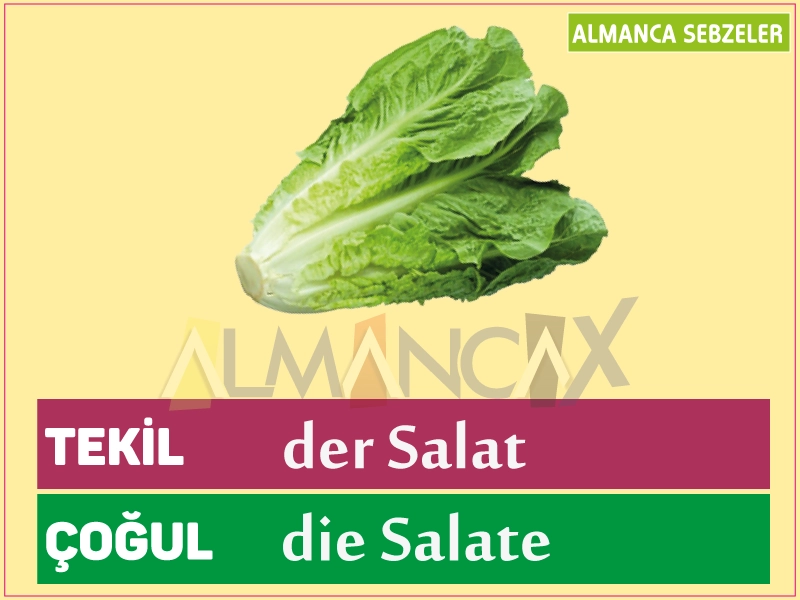
You may be interested in: Is it possible to make money online? To read shocking facts about earning money apps by watching ads CLICK HERE
Are you wondering how much money you can earn per month just by playing games with a mobile phone and internet connection? To learn money making games CLICK HERE
Would you like to learn interesting and real ways to make money at home? How do you make money working from home? To learn CLICK HERE
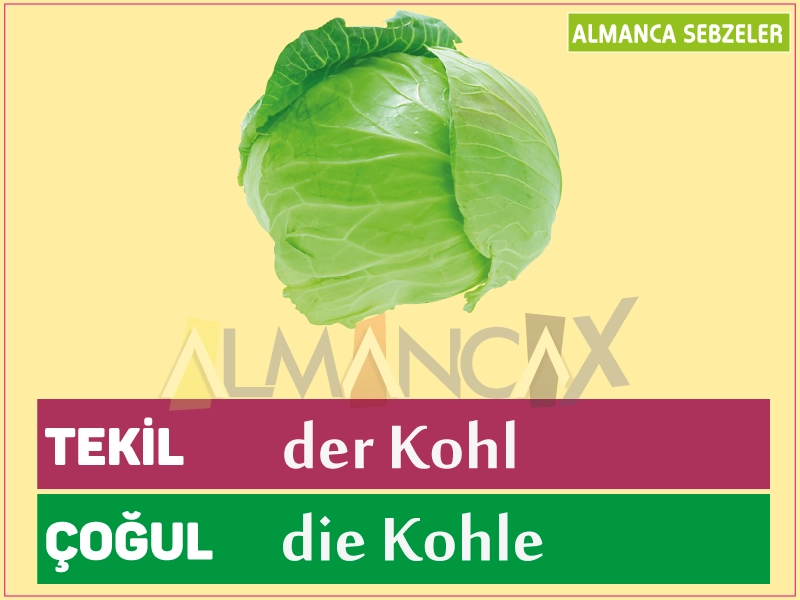
GERMAN NUTS
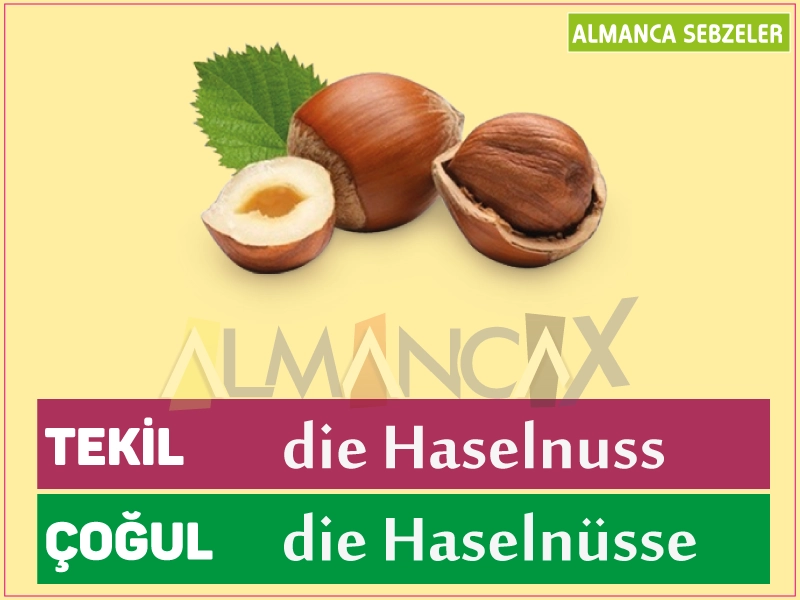

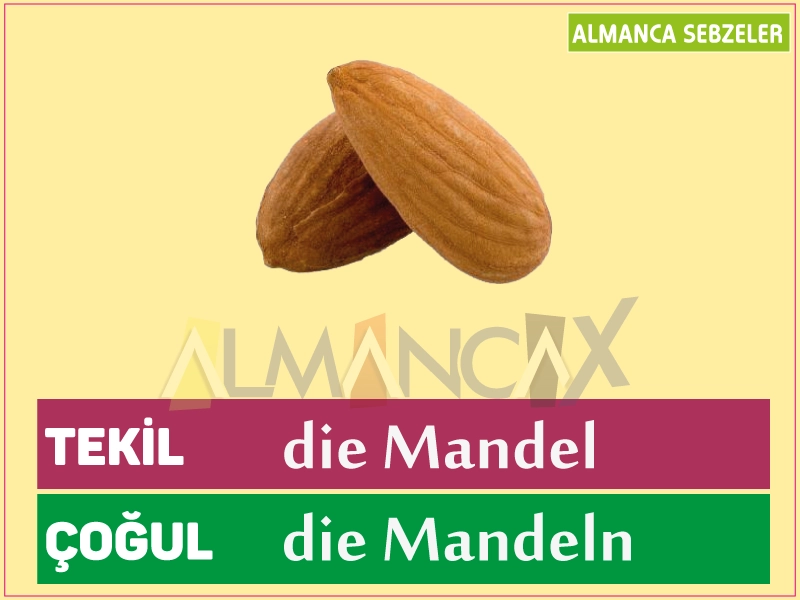

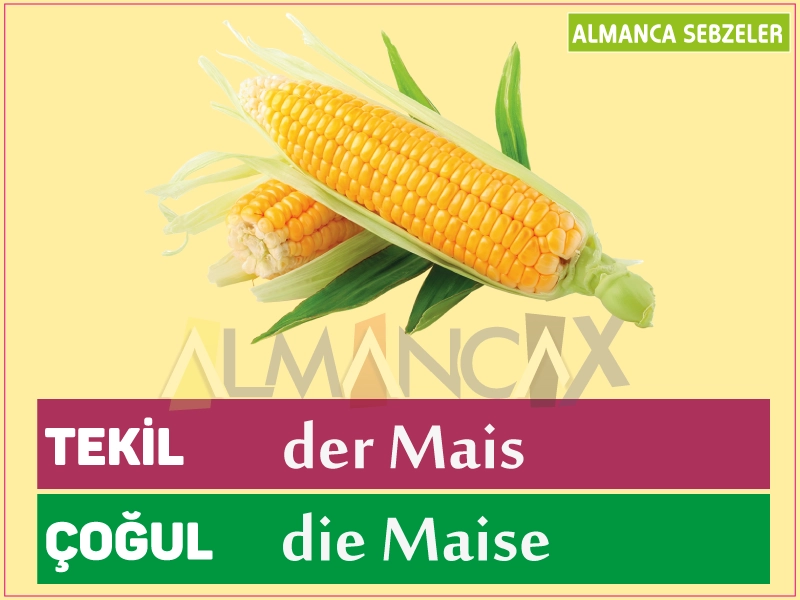
German Vegetables (Gemüse) Our topic titled is based on memorization. It will be much more beneficial for you if you practice using the words you memorized with the most appropriate method for yourself later in a sentence. We would also like to mention about this subject that you must memorize the German vegetable names together with their articles. No matter how beautiful sentences you make with the words you use without an article, it may not be understood by the other person you want to tell. This leads to the conclusion that the sentence you think is actually beautiful is actually meaningless.
GERMAN VEGETABLES IN TABLE
In the above images, we tried to include the most common vegetables we usually use. Now let's expand our list of vegetables in German and present them in a table so that you can see them all together.
| GERMAN VEGETABLES | |
| das Gemüse | Vegetables |
| der Pfeffer | Beaver |
| die Gurke | Cucumber |
| die Tomate | Tomato |
| die Kartoffel | Potato |
| die Zwiebel | Onion |
| der Knoblauch | Garlic |
| der Salat | Salad, Lettuce |
| der Spinat | Spinach |
| Die Petersilie | Parsley |
| der Lauch | Leek |
| der Blumenkohl | Cauliflower |
| says Rosenkohl | Brussels sprouts |
| die Carotte | Carrot |
| der Kurbis | Pumpkin |
| says Sellerie | Celery |
| die Okraschote | Okra |
| die weisse Bohne | Haricot bean |
| die grune Bohne | Green beans |
| Die Erbse | Pea |
| Die Aubergine | Eggplant |
| die Artischocke | Artichoke |
| der Broccoli | Broccoli |
| says Dill | Dill |
Of course, there may be many vegetables that we do not think of during the preparation of this subject. However, it is sufficient to learn the most used and consumed vegetables in German in the first place. Further vegetables can be learned from German dictionaries later as needed. Now let's move on to our sentence examples about vegetables in German.
SAMPLE SENTENCES ABOUT GERMAN VEGETABLES
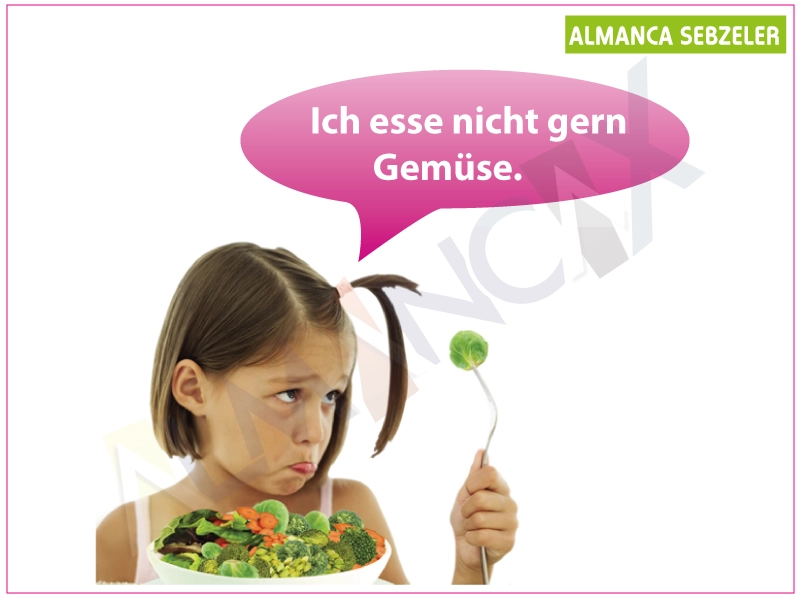
Now let's analyze this image we have seen. The boy in the picture "Ich esse nicht gern Gemüse”He says. So;
- Ich esse nicht gern Gemüse : I don't like to eat vegetables
Or if he wanted to say the opposite, that is, I like eating vegetables, how would he say?
- I'm sorry : I like to eat vegetables
The difference between the two sentences above is in the sentence "notIt originates from the word ”. As you can see "notThe word ”adds negativity to the sentence.
Now let's make other sentences like these. Check out the sample sentences below.
- Ich esse gern Maise : I like to eat corn
- I want you to know Karotten : I like to eat carrots
- Here you go Zwiebeln und Kartoffeln : I like to eat onions and potatoes
- I'm sorry : I like to eat vegetables
- Here you go Obst und Gemüse : I like to eat fruits and vegetables
- ich esse not gern maise : I don't like to eat corn
- ich esse not Gern Karotten : I don't like to eat carrots
- I don't want to worry about Zwiebeln und Knoblauchen : I don't like to eat onions and garlic
As can be seen in the sample sentences about vegetables in German above, in such sentences, the plural form of objects is always used. Let's give another example.
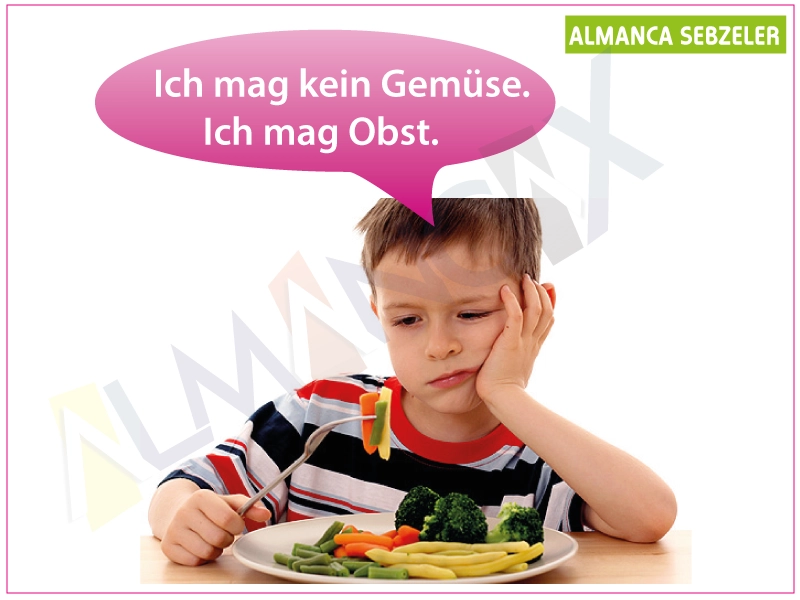
In the picture above, a child "Ich mag kein Gemuse. ich mag Obst”He says. So “I don't like vegetables. (I don't like vegetables). I like fruit.”He says. So why was "nicht" used to make the sentence negative in the previous sample sentences and you might have thought that "kein" was used here. Let's explain it as follows; In the previous sample sentences, the word "nicht" was always before the verb "gern". In the German language, "nicht" is used to make verbs negatively. In the sentence here, we say "Ich mag kein Gemüse". Since the word gemüs is a noun, in this sentence "kein" is used instead of "nicht" in front of the word gemüse. We have given examples of both uses.
INFORMATIVE SENTENCES ABOUT GERMAN VEGETABLES
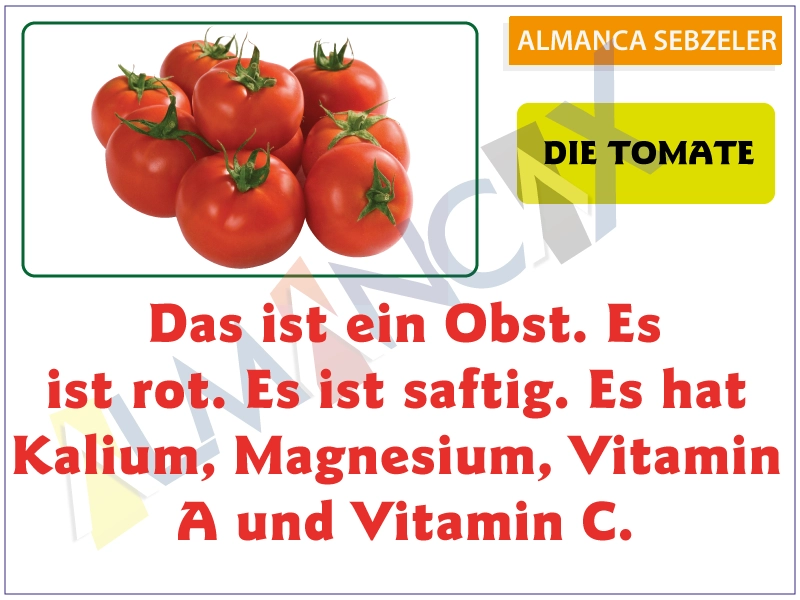
Now let's analyze the sentences in the image above:
- This is the Obst : This is a fruit
- Es ist rot : It is red
- Es ist saftig : He is juicy
- Es hat Kalium, Magnesium, Vitamin A and Vitamin C : SHE IS; Contains calcium, magnesium, vitamin A and vitamin C (has, it means it has)
Note: Since tomatoes are sometimes counted among fruits and sometimes among vegetables, we define them as fruit in this image. If we mean that it's a vegetable "Das ist ein GemuseWe should write as ”.
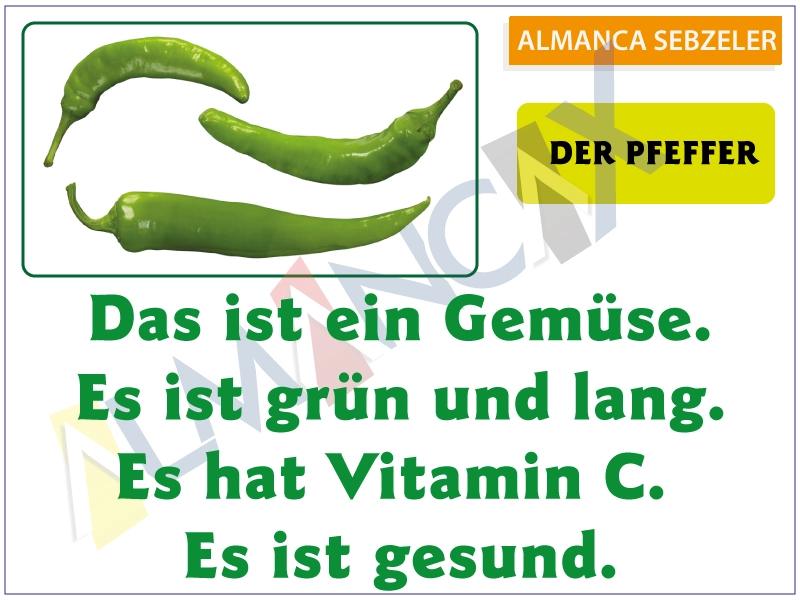
Now let's analyze the sentences in the image above:
- Das ist ein Gemuse : This is a vegetable
- Es ist grün und lang : He is green and tall
- Es line Vitamin C : It contains vitamin C (it has it, it has it)
- Es ist gesund : He is healthy
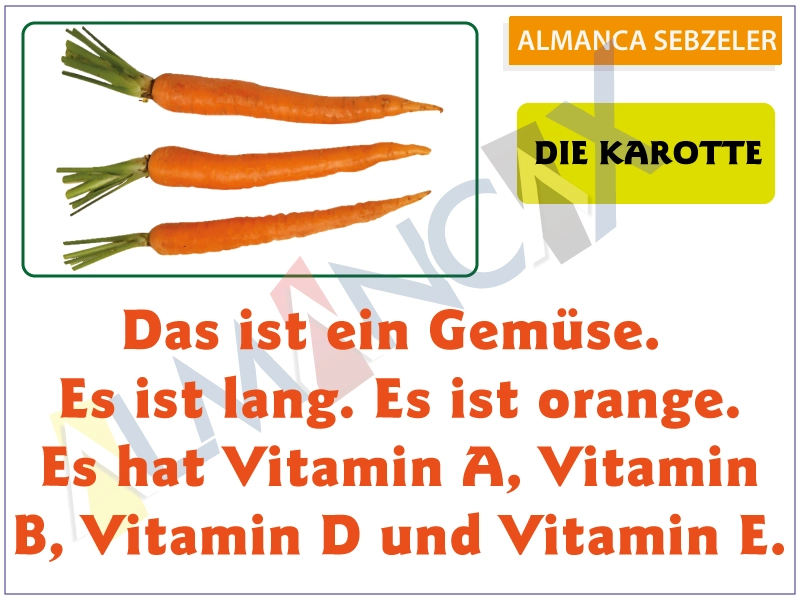
Now let's analyze the sentences in the image above:
- Das ist ein Gemuse : This is a vegetable
- Es ist lang : He is tall
- Es ist orange : He is orange
- Es hat Vitamin A, Vitamin B, Vitamin D and Vitamin E : SHE IS; Contains vitamin A, vitamin B, vitamin D and vitamin E.
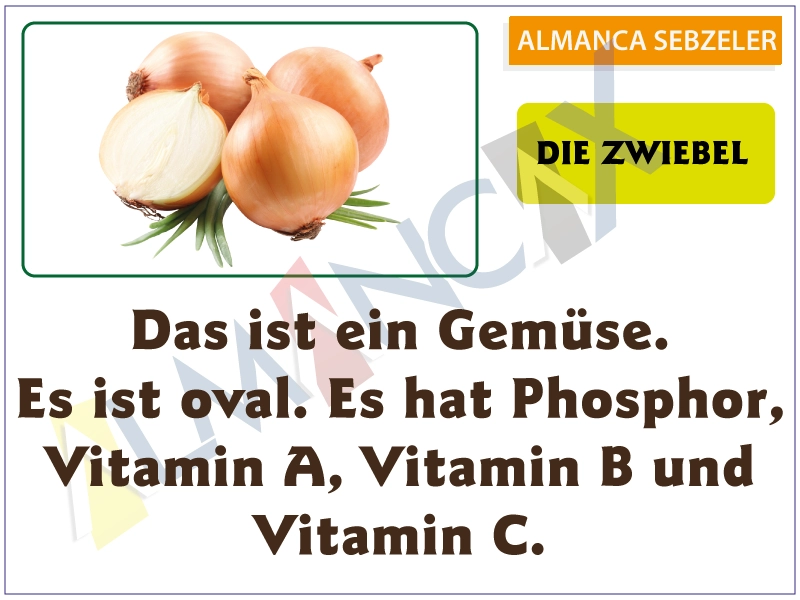
Now let's analyze the sentences in the image above:
- Das ist ein Gemuse : This is a vegetable
- Es ist oval : It is round
- Es hat Phospor, Vitamin A, Vitamin B and Vitamin C : SHE IS; contains phosphorus, vitamin A, vitamin B and vitamin C
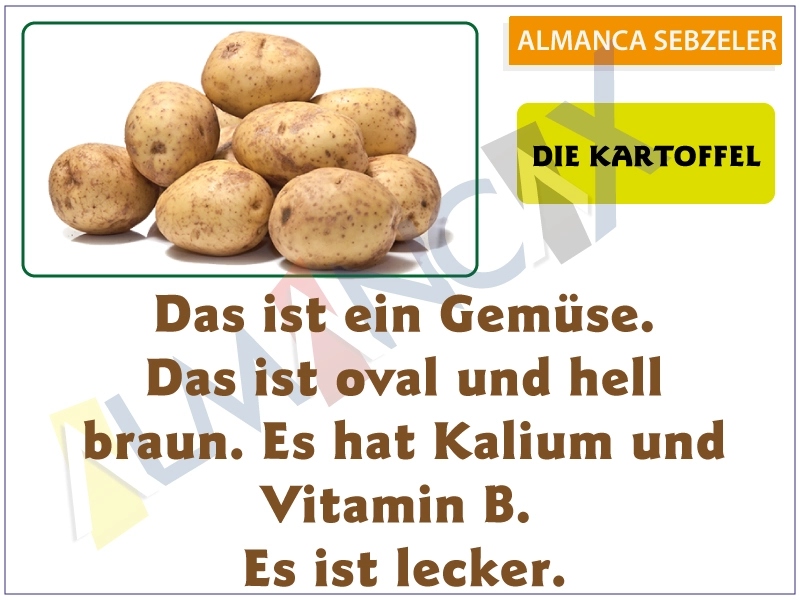
Now let's analyze the sentences in the image above:
- Das ist ein Gemuse : This is a vegetable
- Es ist oval and hell braun : It is round and light brown
- Es hat Kalium and Vitamin B : SHE IS; Contains calcium and B vitamins
- Es ist lecker : It is delicious
Dear students, in this lesson, we have seen vegetables in German so far and wrote sample sentences about vegetables in German. Now let's write a few notes below in terms of general German knowledge, although it is not directly related to the subject.
THINGS TO KNOW ABOUT GERMAN VEGETABLES
Dear friends, above, we have given German vegetables both visually and in a tabular form. Of course, these words need to be memorized, like all German words, together with their articles and their plurals. In addition, we have mentioned it in our previous lessons, but let's give some information by reminding again that there may be friends who do not read. Maybe it caught your attention while examining the images above.
- There is no capital I and lowercase I in the German alphabet. In other words, the letter i has no uppercase and lowercase i Therefore, as with every word, you need to be careful about the spelling of vegetables in German.
- We have mentioned it in our previous lessons. Whether a name is a proper name or a genus name in German, the initial letter is necessarily capitalized. As can be seen in the above images and the table, the initials of German vegetable names are always capitalized. This rule is valid only for nouns, but not for adjectives, pronouns, adverbs, verbs.
Dear friends, In this lesson on vegetables in German;
- We learned German vegetables with their articles.
- We learned the singular and plurals of vegetables in German.
- We learned how to write sentences that can give information about vegetables in German.
- We learned to write other sample sentences about vegetables using verbs as well.
That's all we will give you about vegetables in German. You can now check out our other lessons. We wish you luck.
